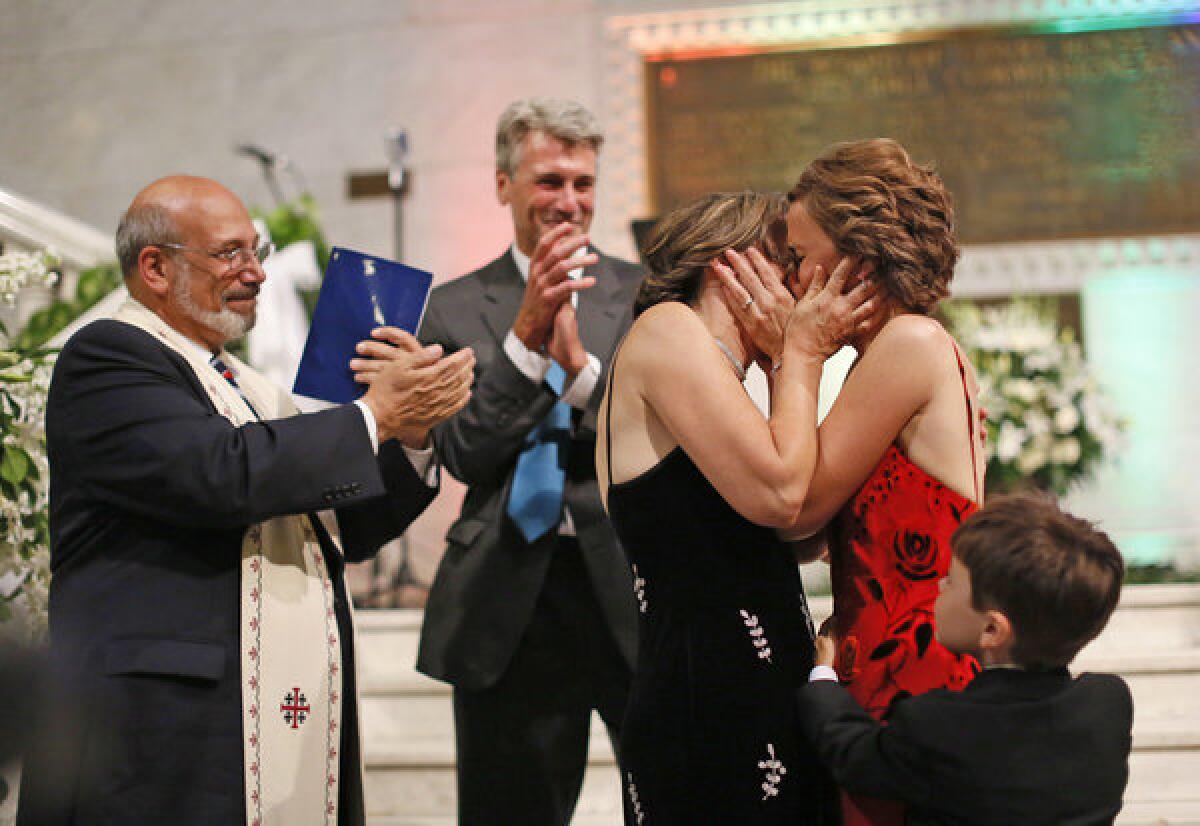Minneapolis mayor puts stamp of history on gay marriages

- Share via
After each gay couple made their way down Minneapolis City Hall’s five flights of marble stairs – past flashy floral arrangements and packs of photographers, past a brass quintet and a gay men’s chorus – they paused for a private chat with Mayor R.T. Rybak.
The 46 couples would become Minneapolis’ first gay newlyweds during a seven-hour marathon of vows that began just after Minnesota legalized gay marriage midnight Wednesday, and Rybak wanted to keep City Hall from turning into a “conveyor belt of love,” he said.
Rybak listened to a pair of rural, middle-aged men recount falling in love at ages 8 and 10 at a skills program held in a barn for young farmers. He spoke with a deaf woman who met her wife, a voice actor, when they were asked to collaboratively portray a character in a play. “She literally gave voice to her wife,” Rybak said in awe.
But when it came time to publicly affirm each marriage, Rybak put aside the rich array of idiosyncratic stories and focused instead on what he called marriage’s old, ordinary traditions:
“Dearly beloved, we are gathered here to make history in the name of love,” he announced to the crowd.
“We wanted the ceremony to feel familiar and normal because it is,” Rybak said in explaining his choice of conventional vows. “Last night was one grand step towards making what once was considered almost unachievable into something that people someday will shrug about.”
Emphatically, he concluded: “That’s progress.”
That mingling of the mundane and profound played out across Minnesota and Rhode Island on Thursday. The states became the 12th and 13th in the U.S. to legalize gay marriage, pushing past 30% the portion of the population living in places where gay marriage is allowed.
“We’re seeing waves of happiness across the heartland and throughout New England,” Evan Wolfson, president of the gay rights group Freedom to Marry, told the Los Angeles Times. “It brings us two steps closer to the freedom to marry nationwide.”
Rhode Island became the last New England state to permit same sex-marriage. Lawmakers in the heavily Roman Catholic state capped a decades-long effort by passing a marriage-equality law this spring.
Minnesota’s gay couples won the right to marry less than a year after voters there became the first in the country to reject a constitutional ban on gay marriage. The state Legislature followed suit this spring by making same-sex marriage legal as of Aug. 1.
The night the bill passed, Rybak recalled, he planted the seed of Minneapolis’ predawn parade of newlyweds. In his euphoria, he yelled into the state Capitol rotunda that he’d marry any revelers who wanted to come to City Hall on Aug. 1.
“People of all ages, all incomes, races and geography” arrived to take him up on his offer, Rybak said. He called marriage equality a “gold mine” for Minneapolis because it would allow the city, already known as a Midwestern destination for immigrants, to compete even more vigorously for talent.
He said employees of locally based General Mills and Pillsbury had already been involved in the night’s festivities, even donating cakes, and he made a pitch to residents of Chicago, Madison, Wis., and Kansas City, Mo., to “come to Minneapolis and marry and maybe you’ll want to live here.”
Gary Schiff, one of two openly gay members on the Minneapolis City Council, attributed the state’s rapid emergence as a vanguard of tolerance to an “overreach” by Republicans on the anti-gay marriage amendment two years ago.
“To come this far, this quickly -- it feels like political and historical whiplash,” he said.
The change has not been universally embraced. On Thursday, the conservative group Minnesota for Marriage announced a campaign to defeat state representatives who helped pass the gay marriage bill.
“Today is a sad day for at least 1.4 million Minnesotans who very much still believe that marriage is only the union of one man and one woman,” the group’s spokeswoman, Autumn Leva, said.
Rybak said the inclusion of gay couples only strengthened marriage.
After a sleepless climax to weeks of preparation, Rybak predicted he’d crash at some point, but hadn’t yet finished celebrating: “Collectively, people have waited hundreds of years for this, so I think I can wait a few hours to take a nap.”
As he biked home from work Thursday afternoon, sticking to routine even in his sleep-deprived state, he told The Times (by hands-free phone) that he didn’t doubt the sun would rise for both straight and gay couples the next morning.
Gay and lesbian couples’ commitments were no less normal for also having their moment in history, he said.
“Forty-six weddings, 92 people, one thing in common: they all have the same right today that my wife and I had yesterday.”
ALSO:
Government requests for Twitter user data continue to climb
Steamboat Geyser, idle for 8 years, puts on a show in Yellowstone
Bill would fund research on genetic disease affecting New Mexicans
Twitter: @benjmueller
More to Read
Sign up for Essential California
The most important California stories and recommendations in your inbox every morning.
You may occasionally receive promotional content from the Los Angeles Times.










